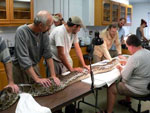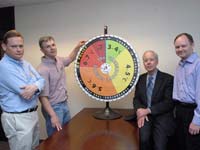Awareness doesn't always translate into action, especially when it comes to green energy behaviors.
Western Washington University study finds that tree leaves on busy diesel bus routes were more magnetic than those from rural areas.
Pacific Northwest National Laboratory and Chinese Academy of Sciences' Institute of Rock and Soil Mechanics researchers identify 100 years of carbon storage reservoirs.
Warmer-than-average temperatures engulfed most of the world's land areas during the month, according to the National Oceanic and Atmospheric Administration.
A Georgia Southern University study analyzed stream water temperatures at six different golf courses in South Carolina.
Exposure to lead in early childhood significantly contributes to lower performances on end-of-grade (EOG) reading tests among minority and low-income children, according to researchers at Duke University and North Carolina Central University.
Foundation slates meeting for December 8 at your desktop.

Five large, non-native snake species may rattle Fla. ecosystem.
Senior scientist applauds collaboration leading to productivity model.
Experiment found that subjects who bought green products exhibited less altruistic behavior.
NOAA's latest analysis says that the Dust Bowl was caused by random changes in the atmosphere, not in ocean temperatures.
Position paper recommends that stakeholders in Copenhagen review the incentives provided by small and medium enterprise corporate taxation systems.
The agency will consider the potential for atrazine cancer and non-cancer effects as well as data generated since 2003 from laboratory and population studies.
A Columbia University study said bad planning for a growing population is to blame for crop destruction, drained reservoirs, and legal claims during the 2005-2007 dry spell.
U.K. researcher and team built a sustainable race car that will be tested Oct. 17.
Penn State engineer and Napa Wine Company use a microbial electrolysis plant to process agricultural wastewater.

Co-director Ron Prinn says we can stabilize climate if the United States and others would meet aggressive emissions targets.
ChemSec and Clean Production Action feature companies such as Apple and Sony in a report on lowering the use of toxic substances in electronic products.
An Iowa State led study team will try to uncover what structures, mechanisms and genetics are involved in the process plants use to store carbon and energy.